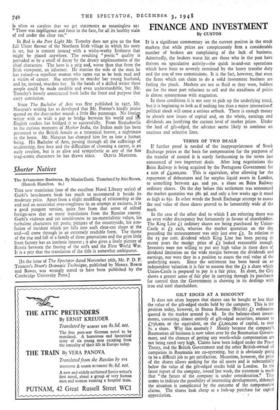FINANCE AND INVESTMENT
By CUSTOS IT is a significant commentary on the current positon in the stock markets,. that while prices are conspicuously firm a considerable number of brokers are complaining of the lack of business. Admittedly, the brokers worst hit are those who in the past have thriven on speculative activity—the quick in-and-out operations which have been so severely, restricted by the heavy transfer duty and the cost of two commissions. It is the fact, however, that even the firms which can claim to do a solid investment business are feeling the pinch. Markets are not as fluid as they were, holders are for the most part reluctant to sell and the steadiness of prices is almost synonymous with stagnation.
In these conditions it is not easy to pick up the underlying trend, but it is beginning to look as if nothing less than a major international political shock will cause a serious setback. There is enough money to absorb new issues of capital and, on the whole, earnings and dividends are justifying the current level of market prices. -Under the lead of gilt-edged, the advance seems likely to continue on cautious and selective lines.
TERMS OF TWO DEALS
If further proof is needed of the inappropriateness of Stock Exchange prices as the basis for compensation for the purposes of the transfer of control it is surely forthcoming in the terms just announced of two important deals. After long negotiations the Beira Railway is being acquired by the Portuguese Government for a sum of £4,000,000. This is equivalent, after allowing for the repayment of debentures and for surplus liquid assets in London, to something between 44s. and 5os. a share on Beira Railway ordinary shares. On the day before this settlement was announced the market quotation was 58s. 9d. and only a few weeks ago it stood as high as 65s. In other words the Stock Exchange attempt to assess the real value of these shares proved to be lamentably wide of the mark.
In the case of the other deal to which I am referring there was an even wider discrepancy but fortunately in favour of shareholders. The King Line £r ordinary shares are being purchased by Union- Castle at £5 each, whereas the market quotation on the day preceding the announcement was only just over £3. In relation to the 15 per cent, dividend which King Line has been paying in recent years the marlset price of £3 looked reasonable enough. Investors were not willing to put any high value in these days of dividend limitation on the wide margin between the dividends and earnings, nor were they in a position to assess the real value of the underlying assets. Since the settlement has been based on an independent valuation it is fair to assume that the £5 a share which Union-Castle is prepared to pay is a fair price. In short, the City shows a greater sense of fair play in carrying through its purchases for control than the Government is showing in its dealings with iron and steel shareholders.
GILT EDGED AT A DISCOUNT
It does not often happen that shares can be bought at less than the value of the gilt-edged stocks held by the company. This is the position today, however, in Steaua Romana (British) Li ordinaries quoted in the market around 5s. 6d. In the balance-sheet invest- ments, consisting almost entirely of gilt-edged securities, amount to £736,000, or the equivalent, on the £2,000,000 of capital, to over 7s. a share. Why this anomaly ? Mainly because the company's Roumanian oil business is now taken over by the Roumanian Govern- ment, and the chances of getting any worth-while compensation are not being rated very high. Claims have been lodged under the Peace Treaty, and, the British Government and the other British-owned oil companies in Roumania are co-operating, but it is obviously going to be a difficult job to get satisfaction. Meantime, however, the price of the shares allows nothing for the oil assets and is substantially below the value of the gilt-edged stocks held in London. In the latest report of the company, issued last week, the statement is made that "the future of the company is under consideration." This seems to indicate the possibility of interesting developments, although the situation is complicated by the outcome of the compensation claims. The shares look cheap as a lock-up purchase for capital appreciation.


































 Previous page
Previous page